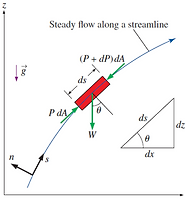My Archive
Cauchy's equation by Extended divergence theorem 본문

Start from linear momentum equation with Reynolds Transport Theorem (p.252)
$$\int_{\rm{CV}}{\rho \vec{g} dV} + \int_{\rm{CS}}{\sigma_{ij}\cdot\vec{n}dA} = \int_{\rm{CV}}{\frac{\partial}{\partial t}\left(\rho \vec{v}\right)dV} + \int_{\rm{CS}}{\rho \vec{v} \vec{v} \cdot \vec{n} dA}\,\cdots (1)$$
For who want to know how to derive equation \((1)\)
Link:
Extended Divergence Theorem:
$$\int_{\rm{CS}}{G_{ij}\cdot \vec{n}dA} = \int_{\rm{CV}}{\vec{\nabla}\cdot G_{ij}dV}$$
Let's apply extended divergence theorem in second term of left side of the equation \((1)\).
$$\int_{\rm{CS}}{\sigma_{ij}\cdot \vec{n}dA} = \int_{\rm{CV}}{\vec{\nabla}\cdot(\sigma_{ij})dV}$$
We can apply also on second term of right side of the equation \((1)\)
$$\int_{\rm{CS}}{(\rho \vec{v}\vec{v})\cdot\vec{n}dA} = \int_{\rm{CV}}{\vec{\nabla}\cdot(\rho \vec{v}\vec{v})dV}$$
Then we can re-arrange equation \((1)\) like below:
$$\begin{aligned}\int_{\rm{CV}}{\rho \vec{g}dV} + \int_{\rm{CV}}{\vec{\nabla}\cdot(\sigma_{ij})dV} & = \int_{\rm{CV}}{\dfrac{\partial}{\partial t}(\rho \vec{v})dV} + \int_{\rm{CV}}{\vec{\nabla}\cdot(\rho \vec{v}\vec{v})dV} \\ \\ 0 & = \int_{\rm{CV}}{\dfrac{\partial}{\partial t}(\rho \vec{v})dV} + \int_{\rm{CV}}{\vec{\nabla}\cdot\left(\rho \vec{v}\vec{v}\right)dV} - \int_{\rm{CV}}{\rho \vec{g}dV} - \int_{\rm{CV}}{\vec{\nabla}\cdot(\sigma_{ij})dV}\end{aligned}$$
$$\int_{\rm{CV}}{\left[\dfrac{\partial}{\partial t}(\rho \vec{v}) + \vec{\nabla}\cdot(\rho \vec{v}\vec{v}) - \rho \vec{g} - \vec{\nabla}\cdot\sigma_{ij}dV\right]} = 0$$
$$\dfrac{\partial}{\partial t}(\rho \vec{v}) + \vec{\nabla}\cdot(\rho \vec{v}\vec{v}) - \rho \vec{g} - \vec{\nabla}\cdot\sigma_{ij} = 0$$
Then we can derive Cauchy's equation from linear momentum equation with Reynolds Transport Theorem
$$\dfrac{\partial}{\partial t}(\rho \vec{v}) + \vec{\nabla}\cdot(\rho\vec{v}\vec{v}) = \rho \vec{g} + \vec{\nabla}\cdot\sigma_{ij}$$
Reference
Advanced Engineering Mathematics
'전공공부 > 유체역학' 카테고리의 다른 글
| 베르누이 방정식 유도 (0) | 2024.10.23 |
|---|---|
| Navier-Stokes equation supplementary (2) (0) | 2023.10.24 |
| Navier-Stokes equation supplementary (1) (0) | 2023.10.18 |
| Second-order tensor expansion (0) | 2023.10.05 |
| Cauchy's equation: Newton's 2nd Law (0) | 2023.09.19 |




